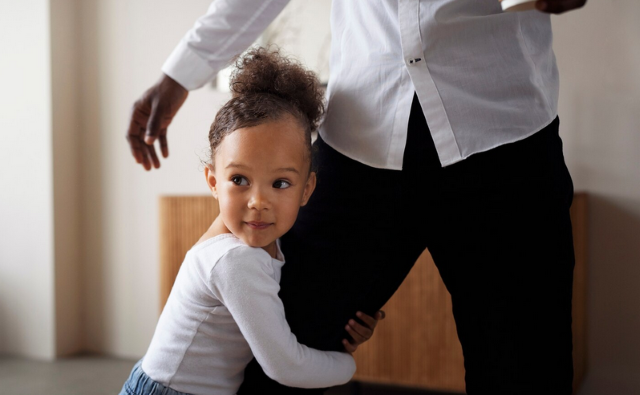If your child follows you everywhere, even to the bathroom, you’re not alone. Parents online are embracing the term “Velcro kids” to describe little ones who crave constant closeness, and it’s sparking a wave of conversation about modern parenting. And of course, the experts weigh-in.

One of those parents is Frankie Acevedo, 38, who told his TikTok followers that his 5-year-old wants to be near him “all the time, whether he’s in the kitchen, backyard or even in the bathroom.” His post, which has nearly 3 million views, struck a chord with parents everywhere.
The term comes from “Velcro babies,” a phrase used to describe infants who prefer to be held and cry when put down.
“My kids sit outside the bathroom and ask me questions,” one commenter said.
“My daughter comes from the living room just to sit on the floor in my room. She doesn’t say anything, she just wants to be in here with me,” another wrote.
A third wrote has the “cure for any velcro kid,” “My kids are glued to me until I mention “let’s go for a walk outside and touch some grass” then they’re no longer Velcro.”

For Acevedo and many other millennial parents, this kind of closeness isn’t a problem, it’s intentional.
“Growing up, it wasn’t like that for me,” Acevedo told USA Today in a recent interview. “We spent most of our time outside or in our rooms, and we weren’t really involved with our parents much. Everyone was pretty much doing their own things.”
Today’s parents are redefining what closeness looks like and social media is helping normalize it. While the term “Velcro parents” isn’t as established as helicopter or gentle parenting, it’s quickly gaining traction among moms and dads who value emotional connection.

“I’m seeing parenting today focus more on curiosity, and trying to understand why the children or child is showing up in the way that they are,” says therapist Elizabeth Schane. “And being able to really enhance emotional intelligence opposed to stuff it and just create rules and compliance.”
Acevedo agrees. “I beat the odds and I’m raising my family completely differently,” he said of overcoming a dysfunctional upbringing.
According to Martha Edwards, director of the Ackerman Institute’s Center for the Developing Child and Family, attachment begins early and it’s vital for healthy development.
“Babies learn early on that if they are distressed, their parent will come and soothe them. This establishes a secure attachment and is essential for proper development,” Edwards said.
But balance matters, too. “If the parent says, ‘just a moment’ and then does come to their baby in a short period of time, the child begins to understand patience,” she explains.

Without that boundary, some children may grow overly dependent. Still, personality plays a big role, some kids are naturally more clingy or cautious. In those cases, Edwards says it’s important for parents to gently encourage exploration and independence.
Interestingly enough, Acevedo says his close bond with his son has had the opposite effect. “He’s the furthest thing from shy,” he told the outlet.
Yet, the one most important aspect of being a velro parent is to find balance. Even parents who love being around their kids all the time can feel overwhelmed. Experts agree that parents need time for themselves and setting loving boundaries is key.






